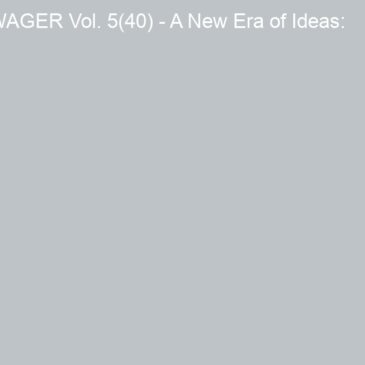The WAGER is in its fifth consecutive year of publication. Started originally as a weekly fax designed to share new and emerging science with public policy makers, scientists, clinicians and the public, The WAGER has enjoyed remarkable success. The WAGER has matured from its modest beginnings at the Massachusetts Council on Compulsive Gambling and the Division on Addictions at Harvard Medical School to become a widely read and referenced scholarly publication. It has introduced thousands of readers to scientific thinking about gambling-related theory, research, treatment and policy matters. With its initial support from the Andrews Foundation, The WAGER was able to nourish its editorial strategies and flourish among gambling opponents and proponents alike.
Now, with the National Gambling Impact Study Commission, the National Research Council and the General Accounting Office reports completed and distributed, it is time to continue a critical examination of the important issues related to gambling. These reports provide an important point of departure for an ongoing dialogue. In addition, there is more gambling-related scientific research being undertaken than ever before. With the increased interest, research and public policy that relates to gambling, it is essential to sustain a scientific exchange of ideas on gambling and its effects. The Internet provides a technological vehicle for the rapid presentation and dissemination of information. It provides a virtual home for a dialogue on complex matters regardless of geographical boundaries.
Using the Internet, The WAGER is now prepared to expand its offerings and its authors. The WAGER will still release its weekly science digest of gambling-related research as before. In addition, with this issue, The WAGER is accepting editorials, comments, letters, and full-length article submissions. These materials will be peer-reviewed by a distinguished editorial board.
WAGER publications will serve as the nexus for a rich and ongoing dialogue that only the Internet can provide. While traditional journals and newsletters remain important, because of the inherent publication lags associated with print media, these vehicles cannot provide the timely exchange of ideas and information that is available only through the Internet. The WAGER already is one of the most widely read and circulated gambling-related publications in the world. The information disseminated through The WAGER is shaping our understanding and response to gambling. By expanding its offerings, The WAGER will continue to be a major force in helping the world understand gambling and its consequences.
From the outset, one of the founders and principal architects of The WAGER, Dr. Howard J. Shaffer, has been insistent that complex social problems such as gambling disorders will be managed best by bringing the full range of stakeholders to the table. Anything less than this dialogue among “competing” constituencies tends to result in interest groups speaking only to themselves. Consequently, The WAGER editorial board and its publications will represent and address a full array of gambling-related issues. Debates and dialogues will be encouraged as a critical channel to finding common ground and resolving the complex gambling-related issues that face contemporary society.
The other originator and prime mover of The WAGER, Thomas N. Cummings, founder and executive director of the Massachusetts Council on Compulsive Gambling until his untimely death in 1998, always wanted The WAGER to grow into a special meeting place for ideas. The WAGER is in a position to meet this vision. Therefore, the Editorial Board is now calling for full-length and brief articles, editorials, and letters to be published in The WAGER. These materials can represent original and previously unpublished work; alternatively, in the spirit of dissemination and dialogue, these submissions can review or revise previously published works. In the latter instance, the revision or review of previously published material must provide new insight on a current debate, dialogue or finding.
In addition to submitted editorials and comments, The WAGER editorial staff will solicit written works. Once accepted for publication, editorials and comments will be sent to discussants for responses to be published along with the primary article. This aspect of The WAGER will promote dialogue, discussion and consideration of complex issues in a timely way that is not available to print media.
Please join us at this time and submit material to The WAGER. Submission guidelines and additional, more detailed information can be found at www.basisonline.org.




